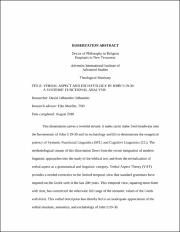| dc.contributor.author | Odhiambo, David Odhiambo | |
| dc.date.accessioned | 2020-07-16T08:14:24Z | |
| dc.date.available | 2020-07-16T08:14:24Z | |
| dc.date.issued | 2018-08 | |
| dc.identifier.uri | https://dspace.aiias.edu/xmlui/handle/20.500.12977/46 | |
| dc.description | Unpublished Dissertation (PhD Religion)
Shelf Location: BS537 .O35 2018 ATDC | en_US |
| dc.description.abstract | This dissertation carves a twofold stream: it seeks (a) to make fresh headways into the hermeneutic of John 5:19-30 and its eschatology and (b) to demonstrate the exegetical potency of Systemic Functional Linguistics (SFL) and Cognitive Linguistics (CL). The methodological stream of this dissertation flows from the recent integration of modern linguistic approaches into the study of the biblical text and from the revitalization of verbal aspect as a grammatical and linguistic category. Verbal Aspect Theory (VAT) provides a needed corrective to the limited temporal view that standard grammars have imputed on the Greek verb in the last 200 years. This temporal view, equating tense-form with time, has constricted the otherwise full range of the semantic values of the Greek verb-form. This verbal description has thereby led to an inadequate appreciation of the verbal structure, semantics, and eschatology of John 5:19-30.
Besides the historical framework of Jewish apocalyptic, three perspectives on John’s eschatology have been offered. Albert Schweitzer stressed future eschatology based on a temporal understanding of the Greek verb, drawing especially from the Synoptic Gospels. Charles H. Dodd and Rudolf K. Bultmann emphasized present eschatology. The majority of scholarship has postulated present-and-future eschatology in John. All these are precarious offerings, however, being drawn from the inadequate appreciation of the Greek verb structure espoused by standard grammars.
This study offers an understanding of John 5:19-30 that better reflects the nuances of its eschatology and, through the insights of VAT, is more solidly grounded on the NT Greek verbal structure. Furthermore, SFL and CL keep the study of this exegesis sensitive to John’s use of language to embed and highlight contextual dimensions in the pericope’s linguistic units. Thus, the study shows how John linguistically portrays Jesus as the primary defining participant and conceptual foci of the pericope’s discourse and eschatology. Furthermore, the study shows how John linguistically presents Jesus’s self-understanding within the Father-Son relationship as shaping the thought world of the periscope. This study thereby demonstrates the exegetical potency of VAT, CL, and SFL offering, at the same time, a comprehensive and a minutely nuanced hermeneutic of the biblical text. | en_US |
| dc.language.iso | en_US | en_US |
| dc.publisher | Adventist International Institute of Advanced Studies | en_US |
| dc.subject | Bible -- John, V, 19-30 -- Criticism, interpretation, etc. | en_US |
| dc.subject | Bible -- John, V -- Criticism, interpretation, etc. | en_US |
| dc.subject | Bible -- Language, style. | en_US |
| dc.subject | Bible. -- New Testament -- Language, Style. | en_US |
| dc.subject | Greek language, Biblical -- Verb. | en_US |
| dc.subject | Greek language, Biblical -- Aspect. | en_US |
| dc.subject | Eschatology. | en_US |
| dc.title | Verbal aspect and eschatology in John 5:19-30 : a systemic functional analysis | en_US |
| dc.type | Dissertation | en_US |

